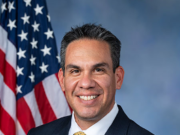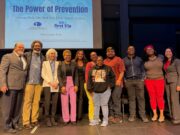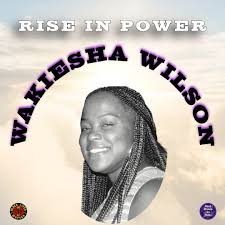Congressmember Sydney Kamlager-Dove and Assemblymember Isaac Bryan join BLMLA and Wilson’s family to announce federal and state bills aimed at preventing neglect and lack of accountability in police custody deaths.
LOS ANGELES, CA – On Friday, March 28, Congressmember Sydney Kamlager-Dove stood alongside the family of Wakiesha Wilson and Black Lives Matter-Los Angeles (BLMLA) outside the LAPD Metropolitan Detention Center to mark the ninth anniversary of Wilson’s death. The gathering also served as the platform to announce two new legislative measures aimed at ending systemic neglect and lack of accountability when individuals are harmed or killed while in police custody or behind bars.
Wakiesha Wilson, a 36-year-old Black woman, died in an LAPD jail cell on Easter Sunday, March 27, 2016. She was found hanging in her cell and was pronounced dead at a hospital approximately an hour later. The LAPD ruled her death a suicide, but her family and community activists have long challenged that account, pointing to inconsistencies, procedural failures, and a lack of transparency.
The most glaring breakdown occurred when Wilson’s mother, Lisa Hines, attempted to locate her daughter after she failed to appear for a scheduled court hearing on March 29, 2016. Despite repeated attempts to gather information, it was not until March 30 — nearly 76 hours after Wilson’s death — that an LAPD supervisor directed Hines to call the coroner’s office.
“The person on the other end of the line answered, ‘coroner’s office.’ I was at work. I fell out. Anybody — you call a number, they say coroner’s office. You know what’s at the coroner’s office. A lifeless body. And that was my baby,” Hines recounted through tears. “They didn’t have the courtesy to tell me she wasn’t here no more. They had stolen her from me.”
BLMLA co-founder Melina Abdullah expressed outrage over the incident, highlighting the emotional torment Hines endured. “Nobody should ever have to search for their loved one. No one should ever have to hear a voice on the other end of the line say ‘coroner’s office,'” she said. “When we say Black Lives Matter, we mean that we are reclaiming and demanding our full humanity. So for nine years, we’ve been fighting in the name of Wakiesha Wilson.”
In response to these tragic circumstances, Congressmember Kamlager-Dove announced the reintroduction of the Family Notification Act (HR. 10367), a federal bill aimed at ensuring law enforcement agencies immediately notify families when a loved one is killed, injured, or transferred within the federal prison system.
“As we fight for Wakiesha, in the memory of Waukesha and so many others who have fallen victim to a justice system that is not about justice,” Kamlager-Dove said. “I am grateful that this is a bipartisan bill. I want to give thanks to Melina Abdullah with Black Lives Matter, and Assemblymember Isaac Bryan at the state level for also joining in this effort. 24 hours is not a lot of time. It is a reasonable amount of time to inform a family member so that folks know where their families are and they can work to make sure that they are treated with dignity.”
At the state level, Assemblymember Isaac Bryan is carrying a companion bill known as Wakiesha’s Law, aimed at addressing similar notification failures within California’s state and local prisons and jails.
Civil rights attorney Carl Douglas, who represented Wilson’s family in a wrongful death lawsuit resulting in a $300,000 settlement in 2020, recalled his first encounter with Hines. “I remember almost nine years ago when Lisa Hines and her sister Sheila came to my office seeking help. These were not just two women in need. These were two warriors dedicated to a cause,” Douglas said. “I am inspired by the dedication that these women have shown, showing up every Tuesday for years — literally — in the name of their loved one. I am heartened that we have courageous politicians like Sydney Kamlager-Dove and Isaac Bryan who are willing to take reasonable steps so that jail and prison authorities can do the very minimum notifying family members within 24 members of a loved one’s death.”
Wilson’s death led to internal LAPD reviews of how staff handles mental health crises, notifies families of deaths, and coordinates with coroner’s officials. However, activists maintain that systemic change is still desperately needed.
The proposed legislation is the latest effort in a nearly decade-long fight for accountability and transparency in cases of in-custody deaths. Advocates argue that it is past time for the law to prioritize basic human dignity over bureaucratic oversight.
Both the Family Notification Act and Wakiesha’s Law aim to ensure that no family endures the same deafening silence and institutional disregard that has defined Wakiesha Wilson’s case.


































